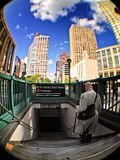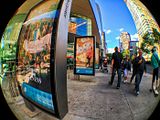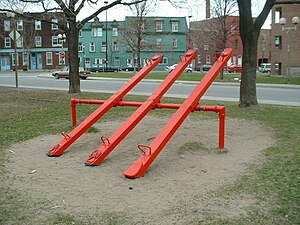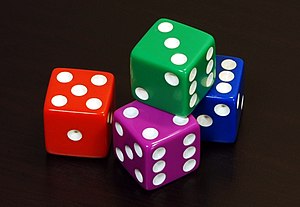Okay, I'll admit it. Despite my best attempts to stay in the moment, live my life mindfully, and not get overwhelmed with regrets about the past or worries about the future, every now and then the shock of my having a progressively disabling disease hits me square on the kisser. As I become more disabled and doing everyday things becomes increasingly difficult, those smacks to the kisser get harder to dodge . Sometimes, when looking at the multitudes walking effortlessly down the streets of the city, or watching a sporting event and seeing tens of thousands of people in the stands eating hot dogs and drinking beer, clapping and shouting and jumping up and down in excitement, I can't help but shake my head and wonder how in the hell I wound up being cursed with this freaking disease? I mean, what were the odds?
Well, during one such moment, I decided to do some quick calculations and figure out what the odds of my getting MS actually were. This is assuming, of course, that I do have MS, which isn't certain since my diagnosis is still a matter of some disagreement, but just for giggles and shits let's just say that my creeping paralysis is MS. That controversy settled, figuring the odds of my getting MS involved a relatively simple series of calculations. Since I'm an American, I based my calculations on the statistics relevant to the USA. The precise numbers vary from country to country, since Canadians and folks in Northern Europe have a higher risk of getting MS, and people living closer to the equator or in Asia have a lower chance of contracting the disease. In fact, people living in the northern United States have a higher chance of getting MS than those living down south (I think this might have something to do with grits), but math was never my favorite subject so I decided not to overstress my feeble noggin and just use the numbers for the USA as a whole.
So, given that the population of the United States is somewhere around 300 million, and there are an estimated 400,000 MS patients in the USA, the chance of any one American getting MS is 1 in 750. However, women get MS in greater numbers than men; the most commonly used figures indicating that the ratio of MS stricken women to men is 3 to 1, although in recent years this number has been widening, and women have been getting MS in even greater numbers than men (I'm pretty sure this has nothing to do with grits). For my purposes, though, given the feeble noggin thing, I went with 3 to 1. Therefore, using the aforementioned figures, the odds of any one female in the USA getting MS are 1000 to 1, and the odds of an American male getting the disease are 3000 to 1.
In other words, if, when healthy, I were sitting in an auditorium with 3000 other healthy men, chances are that one of us would get MS, meaning that any individual in that auditorium would have a 3/10 of 1% chance of getting the disease. And the winner is… me. And any other guy reading this who has MS. As the theme song for the old TV show Candid Camera used to say, "when it's least expected/you're elected/it's your lucky day/smile, you've got creeping paralysis". Okay, so that's not exactly how the song went, but I'm using some artistic license here, like I'm Picasso or Keats, and this is art. As if.
Going through all of the above calculations got me thinking about some of the other longshots that I've experienced in my life. In 1994, I hit Florida's "Fantasy Five" lottery, matching all five numbers on my ticket with the winning numbers, netting a nifty little prize of about $14,000. I did a little digging on the Internet, and found out that my odds of holding that winning ticket 18 years ago was 1 in 65,780, so I was much more likely to get MS than win the lottery. Having done both, I can say one thing with absolute certainty. Winning the lottery is a lot more fun (and lucrative).
Way back in 1987, while playing golf for maybe the seventh or eighth time in my life, I hit a hole-in-one. Now, the course I was playing on wasn't a regulation size golf course, but what they call an "executive course", in which the holes are shorter than on the bigger links. Still, I had absolutely no idea what I was doing, and I hit a tiny little ball about 180 yards into a tiny little hole. According to the Internet, my odds of doing this were 5000 to 1, although I have to say that, given my inexperience and general ineptitude with a golf club, I'm pretty sure that there's no way in hell I could have duplicated that feat in 5000 tries. Or even 50,000 tries. Regardless, the chances of my getting MS turn out to be much higher than my hitting that hole-in-one. Again, having done both, getting the hole-in-one was a lot more fun. Seeing the looks on the faces of the people I was playing with was absolutely priceless.
All of the above numbers started my mind whirring, or at least wobbling, and doing a little more searching, I came across a whole bunch of other statistics with which to compare my chances of getting MS. The numbers regarding cancer were downright startling (click here). The risk of an American male developing cancer is 1 in 2, for an American female it's 1 in 3. Holy crap! So much for that vaunted War on Cancer we keep hearing so much about. If you’re a guy, the form of cancer most likely to send you off to meet your maker is lung cancer (1 in 15), followed closely by prostate cancer (1 in 36). For you gals, lung cancer will do away with 1 out of 20 of you, and breast cancer will claim 1 in 36 members of the fairer sex. Honestly, I had no idea the numbers for cancer were this high. Of some measure of solace is a new study that indicates that people with MS have an overall lower risk of cancer (click here), although it seems to be lower for some cancers and higher for others.
Here are some other grim statistics. Chances of dying from: heart disease-1 in 3, a car accident-1 in 18,585, any kind of injury-1 in 1,820, food poisoning-1 in 3,000,000, shark attack-1 in 300,000,000. Guess I don't have to worry too much about shark attacks, a fear which preoccupied me when I was a kid. Especially since I'm now partially paralyzed, and the odds of me actually going in the ocean are about 1 in 100 gazillion, give or take a few gazillion. Unless a Great White shows up in my apartment, I'm probably safe.
According to the Internet, my odds of winning an Olympic medal are 662,000 to 1, although much like the shark thing, in my current condition the odds of my winning Olympic pay dirt are about the same as those of monkeys flying out of my backside. Unless, of course, they add "hitting pedestrians with a power wheelchair" to the list of events, in which case I believe I'd be the favorite, especially given the increasing wonkiness in my "wheelchair joystick controlling" hand. The Internet also says my odds of getting canonized are 20,000,000 to 1, but I think that number may be a little off for me, what with my being Jewish and all. Not that I wouldn't like to be canonized, but rules are rules. Still, Saint Marc, patron saint of writing drivel on the Internet, it has a nice ring to it. On the other end of the spectrum, the odds of someone being considered possessed by Satan are 7000 to 1. Not sure of the accuracy of that number, though, as church documents confirm that at least 50% of my ex girlfriends were possessed by Satan. Luckily, I married an angel.
So, in the grand scheme of things, the odds of my getting MS (3000 to 1) were shorter than my getting a hole-in-one (5000 to 1) or winning the lottery (65,750 to 1), all of which I accomplished, but longer than the chances of my getting away with murder (2 to 1), developing hemorrhoids (25 to 1), or being on a plane with a drunken pilot (117 to 1), none of which I've yet to experience. I'm not quite sure exactly what wisdom there is to be gleaned from this jumble of numbers, but I do know this: the odds that MS sucks great big fat hairy monkey balls are a dead solid 100%.
Friday, June 22, 2012
Friday, June 15, 2012
Taking the Good with the Bad (Some New Photos for the Gallery)…
(Just a quick note: due to the high volume of e-mail generated by this blog, and the increasing challenges posed by my illness, I will regretfully no longer be able to answer every e-mail sent to me via the "e-mail me" button on the left-hand column of this page. I deeply appreciate e-mail contact from the readers of Wheelchair Kamikaze, and will continue to read everything sent my way, but the realities of my situation (being sick takes up way too much time) have made directly answering each e-mail extremely difficult. I'll still try to answer as many as I can, though. I hope y'all understand…)
In my last post (click here) I recounted the details of my most recent wheelchair trip to the Conservatory Gardens in Central Park, when the progression of my disease crept up and bit me on the ass, making my "new normal" abundantly clear. I had gone to The Gardens to do some photography, and despite the day not going quite as I had planned, I did manage to take some photos of the springtime glory that was my reason for setting out for that spot in the first place. About half of the below photos were taken on that day. I think some of them turned out pretty well, so I'm happy to share them with you here, and also have them represent a big "fuck you" to Multiple Sclerosis (or Solitary Sclerosis (click here) or whatever it is the hell I have). All of the photos of flowers and cherry blossoms were taken at The Gardens, but so too was the image of the chained iron fence, so I guess a bit of symbolism could be extracted from this collection, for those inclined to look for such things. Beauty and the beast, so to speak…
The remainder of the photos were all taken with my handy dandy iPhone camera on the streets of NYC and along the Hudson River. I purchased a neato clip on lens thingy for the iPhone, called an Olloclip (click here). The Olloclip slides right onto the iPhone, and includes three lenses in one gadget: a wide-angle lens, a macro lens (for taking close-ups), and a fisheye lens. The fisheye lens takes extreme wide-angle shots, covering an almost 180° field of view, making for some very interesting visuals. Fisheye lenses generally cost many hundreds of dollars, and the Olloclip was well under 100 bucks, so the quality of the lens has some "personality" that is lacking (hopefully) in its much more expensive cousins. Still, it's a hell of a lot of fun to play with, and the images it produces are, I think, quite passable. You'll be able to identify the fisheye shots immediately, as they're the ones featuring circular frames and wildly distorted objects. If you have an iPhone 4 or 4S, and want to have some fun with the surprisingly high-quality camera included in the gizmo (which is why I got mine), I give the Olloclip a big thumbs-up. I would give it two thumbs up, but MS has staked a claim on one of my thumbs, along with the other fingers on that hand. I still have one functional middle finger with which to salute the disease, though, so here's looking at you, kid……
As always, your critiques and comments are not only welcomed but desired. No need to hold back or be polite, if you think some of these are pure crap just let loose and say so. Conversely, if any of them truly tickle your fancy, well, flattery will get you everywhere. Click on the thumbnail to view a larger image…
In my last post (click here) I recounted the details of my most recent wheelchair trip to the Conservatory Gardens in Central Park, when the progression of my disease crept up and bit me on the ass, making my "new normal" abundantly clear. I had gone to The Gardens to do some photography, and despite the day not going quite as I had planned, I did manage to take some photos of the springtime glory that was my reason for setting out for that spot in the first place. About half of the below photos were taken on that day. I think some of them turned out pretty well, so I'm happy to share them with you here, and also have them represent a big "fuck you" to Multiple Sclerosis (or Solitary Sclerosis (click here) or whatever it is the hell I have). All of the photos of flowers and cherry blossoms were taken at The Gardens, but so too was the image of the chained iron fence, so I guess a bit of symbolism could be extracted from this collection, for those inclined to look for such things. Beauty and the beast, so to speak…
The remainder of the photos were all taken with my handy dandy iPhone camera on the streets of NYC and along the Hudson River. I purchased a neato clip on lens thingy for the iPhone, called an Olloclip (click here). The Olloclip slides right onto the iPhone, and includes three lenses in one gadget: a wide-angle lens, a macro lens (for taking close-ups), and a fisheye lens. The fisheye lens takes extreme wide-angle shots, covering an almost 180° field of view, making for some very interesting visuals. Fisheye lenses generally cost many hundreds of dollars, and the Olloclip was well under 100 bucks, so the quality of the lens has some "personality" that is lacking (hopefully) in its much more expensive cousins. Still, it's a hell of a lot of fun to play with, and the images it produces are, I think, quite passable. You'll be able to identify the fisheye shots immediately, as they're the ones featuring circular frames and wildly distorted objects. If you have an iPhone 4 or 4S, and want to have some fun with the surprisingly high-quality camera included in the gizmo (which is why I got mine), I give the Olloclip a big thumbs-up. I would give it two thumbs up, but MS has staked a claim on one of my thumbs, along with the other fingers on that hand. I still have one functional middle finger with which to salute the disease, though, so here's looking at you, kid……
As always, your critiques and comments are not only welcomed but desired. No need to hold back or be polite, if you think some of these are pure crap just let loose and say so. Conversely, if any of them truly tickle your fancy, well, flattery will get you everywhere. Click on the thumbnail to view a larger image…
 |  |  |  |
 |  |  |  |
 |  |  |  |
 |  |  |
Monday, June 4, 2012
Tipping Points
 |
The progression of disability brought about by progressive MS can be likened to the circumstance of a bucket placed under a leaky roof, slowly filling with water. The level of water rises almost imperceptibly with each drip; slowly but surely, however, the bucket reaches the point at which it can hold no more water, and the next drop causes it to overflow. That last drop, which sends liquid cascading down the sides of the bucket and onto the floor, is a tipping point, the moment when what was once indiscernible suddenly becomes impossible to ignore, and adjustments must be made.
Much like the water in that bucket, the level of disability in a patient suffering from progressive MS proceeds ever so slowly, invisible on a day-to-day basis, sometimes barely noticeable even week to week or month to month. This gradual progression can lull one into a false sense of security, fostering the desperate hope that maybe this is as bad as things will get. And then it happens, a moment when the bucket overflows and the disease gets its jaws around you and shakes your world like a terrier delivering the coup de grace to some unfortunate rodent, and the patient is left to process this new normal and try to make the changes necessitated by it.
I've reached a number of such tipping points along the path down which my disease has led me: The time at work when my "dropped foot" caught on the hallway carpet and sent me into a stumbling, flailing, long-distance attempt to keep my balance as I lurched forward, almost landing in the arms of none other than Tony Bennett (I worked in one of the major audio/video production houses here in NYC), an incident that convinced me of the need to get my first ankle brace, which I'd been vehemently resisting up to that point; the moment when it became clear that simply getting to work was taking so much out of me that it was negatively impacting my health, and I applied for disability; the day I realized that I could not walk anywhere, even in my apartment, without holding onto the furniture, a wall, a doorknob, or some other stable object, and I caved and ordered my first cane; another day some year or so after that, when, at my wife's urging, I finally admitted that even with a cane I could not make it more than about 100 feet, and I reluctantly started the process to purchase my wheelchair, an act that at one point had been almost unimaginable, the stuff of nightmares.
Each of these incidents was preceded by a period of relative quiet, when I went about my usual business, however restricted that business might be. As my right arm and leg weakened, my left side took up the slack, and even though I am a born righty I learned to use my left side rather adeptly, even training myself to be a passable lefthanded chopstick user, a very important skill for a fan of all foods Asian. In retrospect, I did notice some of the incremental changes as they were happening, and sometimes even voiced concerns about them, but since these tiny deficits didn't force the issue, I could halfheartedly convince myself that I was just having a bad day, or maybe I'd slept funny, or perhaps I'd caught a little virus or cold that was weakening my system. Inevitably, though, the time came when the bucket overflowed, and some new tools, both emotional and mechanical, were needed to clean up the mess.
I recently experienced yet another tipping point, one that I'll admit has been more than a little unnerving. One of my favorite wheelchair journeys has been a trip to Central Park's Conservatory Gardens (click here), which are located about as far away from my apartment as you can get in the wide expanses of the Park, requiring a round-trip journey of about 8 miles. The gardens are a treasure, and a fair number of the photos included in my "Wheelchair Kamikaze Photo Gallery" were taken there.
Because my wheelchair can travel quite fast, 8.5 mph, I was able to cover the distance from my building to the gardens in about 25 minutes, and indeed the chair has allowed me to explore parts of the Park that many of my walking friends have never accessed. I took great pleasure in my jaunts to the gardens, not only because of the beauty of the destination, but also because, in a sense, they showed me and my chair to be more able than disabled, at least in certain circumstances, and actually earned the envy of some of my able-bodied friends and family.
I had last visited the gardens sometime in late October or early November 2011, when they were ablaze in a natural fireworks show of multicolored chrysanthemums and autumn yellows, reds, and oranges, the chill in the fall air making my journey there all the more bracing. Last month I attempted to make my first trip of 2012 to the gardens, eagerly anticipating the springtime visual fiesta that was sure to await me and my camera. While traveling full throttle through the Park, using my "good" left arm and hand to manipulate the wheelchair's controller, I noticed a strange sluggishness in my fingers and hand. When I arrived at the gardens, I took out my camera and set it up on the tripod mounted to the arm of my wheelchair, and started taking some photos, but for the first time experienced some real difficulty manipulating the controls of the camera. Still, choosing willful ignorance, I forged ahead, snapping pictures and scooting around the beautifully landscaped setting.
I soon needed to change lenses, and that's when the real trouble started. I had an unusually hard time taking off the lens that was already mounted to the camera, and in doing so dropped the lens, which luckily landed softly in my lap. I grabbed for the lens as it fell from my hand, though, and as I did so my wedding ring flew off of my finger, bounced off the chair, and landed deep in some bushes or flower beds. I spent the next 45 minutes using my cane to shake the shrubberies and gingerly poke around the flowers, but to no avail. Hard as I looked, I just couldn't find the ring. As daylight quickly faded, my heart sinking, I finally had to admit that the ring was lost. Yes, a wedding ring is only an object, and even though it had tremendous sentimental value, it can be replaced. At that moment, though, that ring represented so many other losses that my wife and I have suffered through the years courtesy of my disease. I was diagnosed only one year after Karen and I were married.
Deeply saddened and cursing the universe, I gave up my search and started the trek home. My left arm and hand were growing less responsive with each passing minute, making it difficult to control the wheelchair. When I finally exited the park and headed down the city streets to my apartment building, my hand decided all on its own that it didn't like the direction I was traveling, and I swerved right into the side of a building, hitting it with a clattering thunk. Luckily, no damage was done to either the chair or my body, but the message was unmistakably clear: my left side is falling victim to the disease, just as my right side did, and the ticking clock that I share with all who suffer from progressively disabling disease grew exponentially louder.
I won't pretend that I handled this incident with bravery or grace or heroism. It shook me to the core, and was the source of heart wrenching dismay and a good long bout of soul-searching. This time there is no magical piece of medical equipment to help me adapt to the situation, my new normal can only be countered with attitude and acceptance. In reality, my situation the day before the incident and the day after hadn't really changed, only my awareness of the circumstances were different. The enemy known is better than the enemy unknown, and at least I can now say with certainty that my left side is weakening, a fact that had been unable to be confirmed by previous physical testing. On some level, I've known this reality for several months, regardless of subjective test results. Nobody knows our bodies better than ourselves, and we notice incremental deficits far in advance of them being obvious to outside observers.
I now have to resign myself to the fact that my wheelchair trips can no longer be open-ended, restricted only by the juice left in the chair's batteries. I have to be aware of the limited functionality in my left side, which gets worse as the day wears on, and allow myself to rest when necessary. My left leg is also noticeably weaker, making it harder to compensate for my useless right side, so I'll need to be all the more vigilant when standing, taking a few steps, or showering, so that I don't tumble to the ground. This is the hard truth of the situation, and no amount of wishing, hoping, moping, bitching, complaining, cursing, or sulking is going to change that.
I will do my absolute best to operate within the confines of this new normal, and will not be defined by what I can't do but by what I still can. I might not be able to travel to the far reaches of Central Park, so instead I'll have to explore the many acres closer to home, some of which I've overlooked because of my ability to travel far and wide. I won't stop taking photos, I'll just have to be more diligent about setting up the camera and manipulating its controls; perhaps this will lead to a more disciplined approach and some better photographs. I've also having issues with increased levels of MS fatigue, which can be just as disabling as weakened arms or legs, so I'll work with my body instead of fight against it, and understand that in my new normal "carpe diem" might sometimes mean spending a day or two doing nothing but catching up on missed movies or shows about ancient aliens on the History Channel.
I'll continue to vigorously pursue treatment options with the physicians working on my case, and will be an even louder self advocate than ever before. New treatment options seem to constantly present themselves, and I'm currently trying two or three outside the box approaches that may be longshots, but every so often longshots come in, and when they do they bring with them great rewards. Most of all, though, I will focus on each passing moment, occupying it consciously and as fully as possible. The only thing that can be done about past regrets is to learn from them in order to live a more fulfilling present. The future is a great unknown; some people who are perfectly healthy today will be dead tomorrow, and if life has taught me anything it's that our paths are made up of nothing but blind curves. I'll practice kindness to others and, perhaps more importantly, to myself.
I know for sure that there will be more tipping points in the future, but I also know that they don't necessarily have to be negative ones. With due diligence and some good luck, perhaps my next tipping point will be a positive, liberating rather than confining, and my next new normal will be a return to an old normal. Tomorrow's story has yet to be written, and yesterday's setback may require adjustments, but does not necessarily have to be a harbinger of things to come.
Time to get a new bucket, and to keep on trying to figure out how to fix that damned leak.
Subscribe to:
Posts (Atom)




